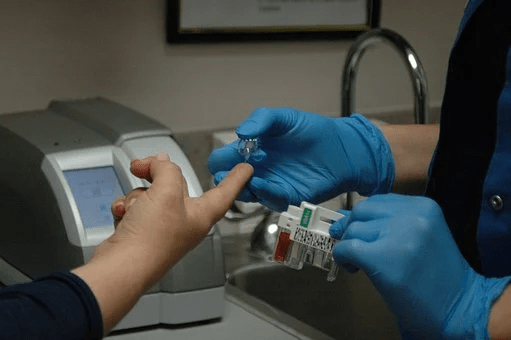theseniordigest.com Newsletter
Deliver to your inbox: medically certified health and wellness information
10 Important Tests For Type 2 Diabetes

Diabetes could get complicated and affect the body if it goes undiagnosed. Testing is essential to identify the condition earlier and start treatment before the situation gets worse. Sometimes symptoms appear, but sometimes it develops silently.
Diabetes testing assists in diagnosing prediabetes, a stage before diabetes that can surely turn into diabetes if untreated. Also, if you have diabetes, then you should undergo specific testing and lab procedures regularly.
Diabetes complications alter the normal physiology of different organs and systems, so testing is essential to ensure their functionality. It can affect your kidney, eyes, skin, etc., well before you notice it, while diabetes testing can catch the problems earlier with more chances of recovery.
10 Important Tests Diabetics Must Know!
Following tests are the most important among the diabetes checkup checklist, and you should get them performed:
1- Blood Sugar Test
The blood sugar test is the easiest, cheapest, and probably the most performed test for diabetes. You can test for diabetes at home by pricking your finger with the lancet and assessing over a glucometer screen. Different blood tests for sugar level are:
Random Blood Sugar Test
This test is performed randomly without considering when you ate and what you ate last time. As a result, 200 mg/dl or above random blood sugar level suggests that you have diabetes, especially if symptoms accompany this high sugar level.
Test diabetes at home with your glucometer by pricking the finger with the provided lancet. Keep a good record of your blood sugar patterns from day 1; it will help manage a lot.
Fasting Blood Sugar Test:
In this, you have to take a blood sample after a nightly fast to analyze the serum sugar. A sugar level under 100 mg/dl is pretty standard in this regard, while if the sugar level is between 100-125mg/dl, you have prediabetes. But if the sugar level exceeds 126 mg/ dl, this is a clear indicator of diabetes.
2- A1C Test
The A1C test analyzes the average value of blood sugar over the last 2-3 months. It helps to identify how well your sugar level is maintained and controlled. It has different names like haemoglobin A1C, HbA1C, glycated haemoglobin test.
How does this test assess the glucose level? The A1C test is one of the primary tests for diabetes and its management. Glucose generally binds to haemoglobin, an integral part of the red blood cells, and the A1C test is based on glucose-haemoglobin attachment.
If you have more glucose in the blood, there will be more attachment to haemoglobin, and the A1C test measures the average attached hemoglobin-glucose level. An A1C test result below 5.7% is normal, and if it ranges from 5.7-6.4%, it indicates prediabetes. While if the A1C test result is 6.5 % or above, then you have diabetes.
3- Glucose Tolerance Test
The primary purpose of this test is to determine how well your body can metabolize the administered glucose and ultimately diagnose diabetes and prediabetes. It measures how well the body utilizes the sugar for muscle, fat, and other cells.
The body needs glucose to provide energy to the cells, and insulin hormone supplies this glucose from the blood to cells. If insulin resistance develops, then there is a rise in blood glucose levels.
A glucose tolerance test is used to measure the overnight fasting blood glucose level first. Then after administering a particular sugar drink ( having approx 75 gm glucose), blood sugar is again measured at fixed intervals. Blood glucose level after two hours of drinking sugary beverages helps to measure glucose tolerance.
Following are the reference ranges for two hours:
4- Lipid Profile Test
If you have diabetes, you must undergo a lipid profile test for diabetes at least once a year, according to the American Diabetes Association. It is a fasting test to measure your total serum cholesterol, triglycerides, LDL cholesterols, LDL cholesterols.
You might wonder about normal ranges of blood lipid profiles to compare your test results, Right? Well, here are the few normal ranges for comparison:
Total Cholesterol:
It is the sum of HDL, LDL cholesterol, and triglycerides. Its level should be 200 mg/dl or below to fall within normal ranges.
LDL or Low-Density Lipoprotein:
If you have diabetes, then the healthy range for LDL is 100 mg/dl or below. If you have diabetes and are a heart patient, you should have 70 mg/dl or below LDL level.
HDL or High-Density Lipoprotein:
A healthy range of HDL, good cholesterol is about 45 mg/dl or above for men and about 55 mg/dl or above for women.
Triglyceride:
A regular healthy reading for triglyceride should be 150mg/dl or less.
5- Kidney function Test
The kidney is one of the body's vital organs, as it excretes the waste product and plays a crucial role in urine production. If you have diabetes, your kidneys are at risk of damage, so there is a need to have regular screening.
According to research, every 1 out 3 adult diabetics have a kidney disease too. How does diabetes affect the kidney? High blood sugar increases the risk of renal vasculature damage, ultimately compromising the kidney's normal function.
Kidney testing includes a urine test to detect the protein level and blood tests that show how well the kidney performs. Any abnormality in these tests is a bad condition and needs to be addressed immediately.
How can I prevent my kidney from damaging as a person with diabetes? Well, controlling the predisposing factor has a role in lowering this risk. Managing the blood sugar, blood pressure regulation, and less protein ingestion can prevent or delay diabetic kidney damage.
6- Blood Pressure Check
Diabetes testing requires regular blood pressure checking, as it is easy, and you can even check at home. Diabetes and blood pressure are the worst combination for normal health, and you should maintain it.
But, how can you maintain the blood pressure without knowing its normal range? Diabetics' blood pressure should not exceed 140/80 mm of Hg, and you have to keep a strict check on it to avoid severe complications.
Recommended to check your diabetes score and manage your blood pressure strictly accordingly. People with diabetes and having increased BP are at elevated risk of heart failure, stroke, and other cardiovascular diseases.
7- Foot Check
If you are unable to manage your diabetes, it may complicate. Foot problems are a complication of diabetes and require regular screening. What to check in diabetic foot examination? Look for any wound, infection, bone abnormalities, and any kind of foot injury.
Diabetes sometimes damages the nerves, induces neuropathy, and poor circulation to the feet. It results in loss of sensation, numbness in the feet, making it difficult to feel any wound or injury. Also, reduced circulation results in delayed healing of the damage and ulcers, which could be problematic late
Without regular foot screening, the problem, if it exists, maybe worse without being noticed. So it's crucial to examine your feet daily; it's not a difficult task as you can check them at home.
8- Eye Check
Diabetes affects many areas of the body, and the eyes are one of the targets it may concern. Vision is a great blessing, and no one wants to lose it earlier with diabetes, Right? Regular eye screening by your doctor can avoid optic complications like cataracts, glaucoma, and diabetic retinopathy.
Diabetic retinopathy is the primary concern for optic health in diabetics, as it may lead to reduced, blurry vision, and even sometimes blindness. Only early detection of the optic abnormality, regular monitoring, and immediate treatment after detection can avoid this complication.
According to the American Diabetes Association, if you have type 2 diabetes, you must undergo an eye exam immediately after diagnosing diabetes. Better to check your health score after diabetes diagnosis to get an idea about how the body is functioning after this condition.
9- Dental Tests
Dental tests are essential to avoid diabetic oral complications; about 90% of people with diabetes have oral manifestations. Excessive blood sugar can affect your mouth, and teeth are an integral part of the mouth being affected.
Saliva generally contains glucose, and when there is raised blood sugar, its level also increase in saliva. High salivary glucose induces bacterial growth in the mouth and results in plaque formation over teeth. Plaque is not suitable for dental health and may cause tooth decay and cavity damage.
Diabetes testing includes regular dental screening to avoid plaque formation in the beginning phase. Plaque, if not removed timely, can harden and deposit over the gumline. It may induce bleeding and pain while brushing and cleaning the teeth.
10- Genetic Testing
Type 2 diabetes is a severe medical disorder and generally results from an interaction between environment and genes. Various risk factors induce diabetes, such as blood pressure, obesity, smoking, diet, low physical activity, etc. But you can't deny the genetic aspect of diabetes, which is a bitter truth.
If the parents, either one or both, have diabetes, then the risk of diabetes in offspring increases. According to a study, diabetes development risk in offspring is 40 % if one parent is affected, usually higher if a mother is concerned. And this percentage jumps to 70% if both parents have diabetes.
If your parents have diabetes, then what are you waiting for? Recommended to get your genetic testing done, diagnose diabetes earlier, and avoid any complications in the future.
Related Blogs

How to Decide Whether to Review Medicare Plans
Introduction Navigating the world of Medicare can be complex, yet staying informed about your Medicare plans is crucial for optimal...
What is a benefit period for Medicare?
Introduction Navigating Medicare can often seem daunting, especially when trying to understand specific terms and how they impact your coverage.
Trending

theseniordigest.com Newsletter
Deliver to your inbox: medically certified health and wellness information
By clicking subscribe, I agree to theseniordigest.com Privacy Policy and understand that I may opt out of this subscription at any time.

All Rights Reserved © theseniordigest.com